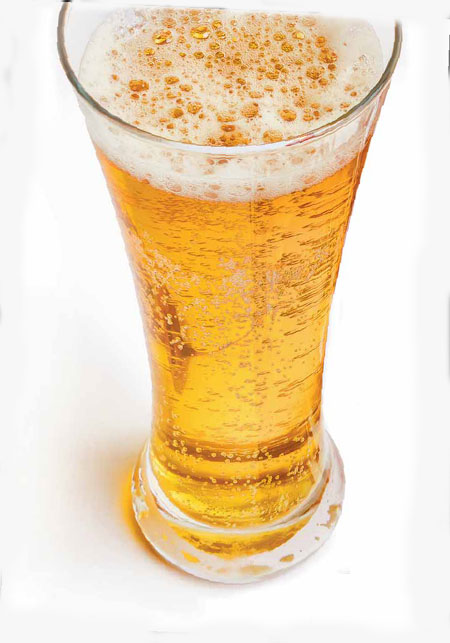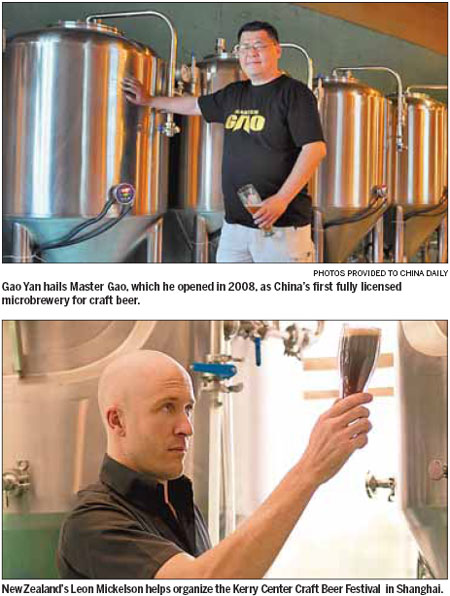A brewing battle
Updated: 2013-10-20 07:59
By Matt Hodges(China Daily)
|
|||||||
Hops warriors are drawing frontlines for the fight to conquer China's craft beer market. Matt Hodges pores over the pours.
Foreigners have been flying the flag for craft beer in China. But as it gains traction among locals in top-tier cities like Beijing and Shanghai - on both the production and consumption sides - a series of potential turf wars may lie ahead.
By the time the sun set on the revelers, barbecues and beer stalls of the 14 microbrewers from around the country that assembled at the Kerry Center Craft Beer Festival in Shanghai's Pudong last month, its days as a mostly foreign affair seemed numbered.
The same goes for China's emerging craft beer market.
There was the Chinese man nosing beakers of craft beer like a professional sommelier. Then there was the flamboyantly displayed tattoo of a Terracotta Warrior on the forearm of a local as he pulled drafts of Hop Warrior, specially made by a foreign brew master and featuring tropically scented hops. The body art suggested a spirit of fearlessness in the face of battle.
But towering over it all was the Buddha-like serenity radiating from Gao Yan, who stood at the other end of the festival on Sept 14, surrounded by fawning acolytes. Gao authored Get Your Own Brew, the first Chinese book on home brewing.
"The Chinese are definitely going to take over the market," Gao says, pulling a pair of spectacles from his shirt pocket.
"There are already more than 150 home brewers in Shanghai. Maybe in five years we'll see more of them turn into real microbrewers."
Many are hamstrung at present by legal regulations that make it difficult to operate small breweries in China, he says. As he spoke, several men rushed over waving copies of his book.
"They're my fans," he says, beaming.
"We went from brewing to educating."
Beijing and Shanghai have emerged as breeding grounds for specialty microbreweries in the last few years. Forbes reports their numbers have doubled since 2010 in Shanghai, where a handful of foreigners rank as the captains of industry in this niche market - for now.
Meanwhile, last month's Beijing Beer Geeks Festival became the first craft beer festival in China to see a majority of Chinese breweries, Beijing Today reports. Participants included Panda Brewpub and Tipsy Face Microbrewery.
"The Chinese microbreweries are actually more experimental than those run by expats because they're more into using weird ingredients like ginseng, asparagus, seaweed, aniseed and Sichuan pepper, which sometimes taste really good - and sometimes taste really bad," says Kathryn Grant, managing editor of the domestic beer magazine Hops.
"It's good, though, because they're coming up with interesting new tastes that you wouldn't find in the West.
"The craft beer culture in China is really interesting right now. It's just starting out, like 10 years ago in the US when brewers started going rogue. It's not just a 'ganbei' (drink to get drunk) culture anymore."
Her free quarterly magazine was published in English in 2011 but went bilingual last year due to popular demand.
"Everybody kept asking us when we were going to do a Chinese version, and now that's bigger than the English one," Grant says.
Its Autumn 2012 edition shines a spotlight on, among other topics, pumpkin ale.
Whereas Shanghai's expatriate craft brewers paint themselves as artisans and beer scientists, Gao comes across more like an unkempt professor.
He hails Master Gao, which he opened in his native Nanjing in 2008, as China's first fully licensed microbrewery for craft beer. But he has yet to see a profit after having invested 5 million yuan ($820,000) in pursuing his dream. Next year will be a game-changer, he says, if he can successfully launch his craft beers nationwide.
"I know we're going to be selling a lot," he says, heavily accenting the last two words.
"The market is there. But I want to make sure everything is ready first."
He has already released a bottled beer called Baby IPA. IPA is a generic term for pale ale that dates back to the India Pale Ale brewed in 19th-century England.
Craft beer began bubbling up through the cracks in China about five years ago. But it may still account for as little as 0.01 percent of the domestic beer market - the world's largest with 50 billion liters consumed in 2011 alone.
In contrast, it makes up 6 percent of the Australian beer market and 12 percent of the US market, according to New Zealand's Leon Mickelson, who helped organize the Kerry Center festival in his role as brew master at its onsite brewery, called simply The Brew.
"What is most exciting for me is being in the world's largest market for beer, which is also the largest untapped market for craft beer," he says. "To be one of the first pioneers here is so rewarding. Every day we're moving forward."
Most Chinese still drink cheap, pale and watery local brands like Tsingtao, Yanjing or Harbin. But young white-collar workers in cities like Beijing and Shanghai are increasingly exposed to premium beer at annual celebrations like Oktoberfest and the Kunshan Beer Festival.
"We're definitely seeing a trend switch, where locals are getting into different styles of beers," says Michael Jordan, the American brew master at Shanghai's Boxing Cat Brewery. "Using local ingredients is part of the story."
Jordan and Mickelson seem as much a binding force for Shanghai's foreign microbrewers as Gao is for the Chinese home brewers.
"A lot of the craft brewers here know each other and support each other. It's a real beer community. That's unique," Jordan says.
"The typical Chinese mentality is more like: Why do you want to help your competitor? But we're all small operators, so we have to build this together.
"I think there is some animosity among home brewers with local versus foreign. But I don't really get into those circles much."
With gauntlet-throwing names like Triple Threat, tropical-fruit-infused hops and exotic ingredients, it's little wonder the novelty-starved Chinese are starting to tune in and chug back.
To tap growing demand, Cheerday Brewery plans to integrate a craft beer section into an 82,000-square-meter beer village that is being built in Qiandaohu (Thousand Island Lake) in Zhejiang province's capital Hangzhou. So says Alan Duffy, an Irish entrepreneur who consults for the architects in charge of the project in the resort area - one of the top destinations for domestic tourists.
American Gary Schkade says: "Chinese don't want the old stuff anymore. They want what other people don't have.
"I work with Shanghainese guys, and 80 percent of them are getting a taste for craft beer. People like Boxing Cat introduced it piece by piece, but now you're getting main guys like Reberg introducing new innovations."
Reberg, a Shanghainese brand, brews its beers locally, packs them in stainless steel bottles and markets them to five-star hotels. As it observes the 16th-century Bavarian Purity Law, it can only contain barley, hops and water, arguably placing it on the more conservative edge of the craft beer spectrum.
Craft beer's influence in China is also pouring over provincial capitals like Sichuan's Chengdu, Hubei's Wuhan and Guangdong's Guangzhou, which have all hosted their own dedicated festivals.
The way Chinese are embracing the culture is itself novel, says Shanghai-based Gudrun Hellauer-Schwichtenberg, deputy general sales manager for BLN Restaurants and Caterings.
"They describe it online as a mixture between beer and food. They also have their own myths around our beer," she says. "They really analyze it, which I don't think people in the West would do."
Back at The Brew's temporary stall in Pudong, which claimed pride of place at the entrance to the beer festival, a middle-aged Chinese man ambled up and barked the word "poppy" several times. It was enough to get him a drink.
Sophie Cheng, a middle-aged woman from Hong Kong, says she enjoyed the IPA, but the pure wheat beer "wasn't as fresh as in Germany".
Generally, beer has been gaining popularity in China in recent years, while demand for wine and spirits has been losing steam.
Beer consumption grew by an average 30 percent a year from 2006 to 2011, according to London-based global market researcher Mintel. Its average price rose by about a quarter in roughly the same period.
Meanwhile, wine sales' growth slowed from 50 percent a year over the 2007-10 period to just 12 percent in 2011. Sales of spirits also saw growth ebb by 8 percentage points to 16 percent year-on-year in 2011.
However, there is still a huge gulf between rich-tasting craft beers that retail for anywhere between 30 to 60 yuan a glass and bottled Chinese beers like Snow or Tsingtao, which can be purchased for about 10 percent of the cost at most grocery stores.
Shandong native Brian Wang, a bartender at the Shangri-La Hotel in Shanghai, explains: "I don't like factory beer. It tastes like water. Craft beer is much better. I first got into Hoegarden, but now I like IPA, pilsner and wheat beers."
When asked for his thoughts on one of the craft beers at the festival, the 23-year-old smelled it before letting it soak into his palette.
"This has wheat in it, but I can't taste the peppercorn. Maybe I'm not very professional yet," he says. "But 30 yuan is a little expensive. We'd normally pay 10 yuan for a glass this size."
However, not all of China's expat brewers are convinced by craft beer's sales pitch.
"I would have a problem selling something I'm not satisfied with, but some of these craft brewers sell batches along the way as they experiment," says Rene Schwichtenberg, a brew master for Paulaner in Shanghai.
Paulaner is one of six breweries in Munich licensed to produce and sell Oktoberfest beer.
"You can't drink craft beer all night. It's not designed for that," Schwichtenberg explains.
"A good beer is one that you can drink all evening and not have a headache the next day. That's a good beer."
Contact the writer at matthewhodges@chinadaily.com.cn.


(China Daily 10/20/2013 page1)